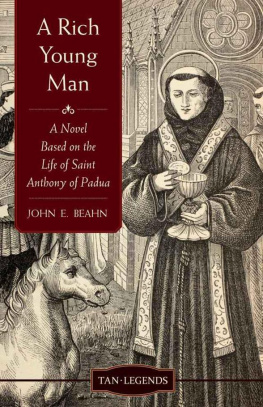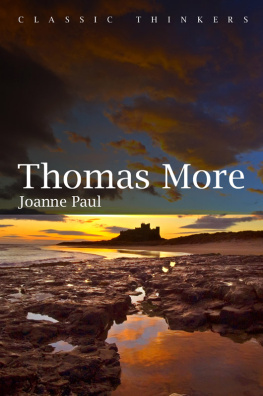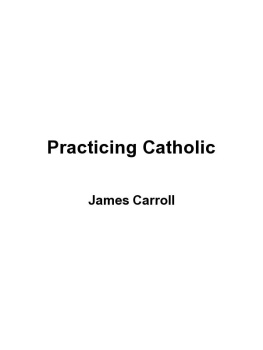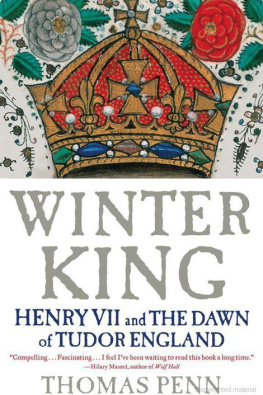
Other titles by John E. Beahn
in the TAN Legends Series
A MAN CLEANSED BY GOD
A Novel Based on the Life of Saint Patrick
A MAN OF GOOD ZEAL
A Novel Based on the Life of Saint Frances de Sales
A RICH YOUNG MAN
A Novel Based on the Life of Saint Anthony of Padua

This book was first published in 1954 by Bruce Publishing Company, Milwaukee, Wisconsin, under the title A Man Born Again: St. Thomas More . This TAN Legends edition has been re-typeset and revised to include corrections of typographical errors and updating of punctuation, spelling and diction.
TAN Legends edition copyright 2013 TAN Books.
All rights reserved. With the exception of short excerpts used in articles and critical reviews, no part of this work may be reproduced, transmitted, or stored in any form whatsoever, printed or electronic, without the prior written permission of the publisher.
Cover design by Caroline Kiser.
Cover Image: Sir Thomas More (engraving, 14771535) by Holbein the Younger, Hans (1497/81543) (after). Private Collection, Ken Welsh. The Bridgeman Art Library.
ISBN: 987-0-9675978-5-0
Cataloging-in-Publication data on file with the Library of Congress.
Printed and bound in the United States of America.
TAN Books
Charlotte, North Carolina
www.TANBooks.com
2013
Contents
To My Parents,
Brothers, and Sisters
And there was a man of the Pharisees, named Nicodemus, a ruler of the Jews. This man came to Jesus by night, and said to him: Rabbi, we know that thou art come a teacher from God; for no man can do these signs which thou dost, unless God be with him .
Jesus answered, and said to him: Amen, amen I say to thee, unless a man be born again, he cannot see the kingdom of God .
Nicodemus saith to him: How can a man be born when he is old? can he enter a second time into his mothers womb, and be born again?
Jesus answered: Amen, amen I say to thee, unless a man be born again of water and the Holy Ghost, he cannot enter into the kingdom of God. That which is born of the flesh, is flesh; and that which is born of the Spirit, is spirit. Wonder not, that I said to thee, you must be born again. The Spirit breatheth where he will; and thou hearest his voice, but thou knowest not whence he cometh, and whither he goeth: so is everyone who is born of the Spirit .
John 3:18
BOOK I
1
T HOMAS More, Londoner-bornthus I began two years ago the epitaph for the tomb in which I thought I should someday lie. At that time, I encouraged myself to believe that I should die quietly and peacefully, surrounded by my family, comforted as to their material welfare when I was no longer with them, strengthened by their prayers and the prayers of priests at my bedside. Had I thought beyond the actual moment of death, I would have imagined my funeral cortege, moving from the parish church through the streets of Chelsea, followed by some number of my friends, to the tomb in the chapel of my own great house.
I know nowI have known since this morningthat my body will never rest in such a peaceful place. I know that my body will be tumbled from the executioners platform into an unmarked grave on Tower Hill; I know that my head will stand sentry atop a pike on London Bridge to appease the Kings anger.
No man has informed me of this; neither King nor Council have yet decreed my death. I know not the exact manner in which I was informed. I know only that I was informed, fully and completely, this morning when I wrote to Father Leder assuring him that I had not and would not subscribe the oath demanded by the King. I know, I wrote, that if ever I should swear it, I should swear against my conscience; and I am very sure in my mind that I shall never be able to change my conscience to the contrary.
I stopped my writing at that point, astonished by the confidence of my assertion that I would not change my conscience. Ever before, when a statement was required of me, I offered my willingness to be instructed by others and to change my conscience if someone show me wherein it be wrong. A humble and prudent man does not cling stubbornly to the dictate of his own conscience when other good and spiritual men follow a different way. Rather does he strive to turn his conscience by study and meditation, by mortification and prayer. All these I did; I felt that I had not been a man of such holy life that I could boldly offer myself to death. Rather than protest the cause of my conscience, I had drawn back lest God, for my presumption, suffer me to fall away from Him. Now I am confirmed and resolutely determined to follow the direction pointed by my conscience even though the end be death. God Himself leads me to it, and I trust in His great mercy that He will give me grace to endure.
Illusion?
God speaks to a man, wrote St. Augustine from his own great experience and knowledge, not by dinning in his ears nor even by means of angels, but by evident truth manifest to him who is prepared to hear with the mind rather than the body. For He speaks to that faculty of man which is greater than all else in him, and which is excelled only by God Himself.
In such manner was I informed. The knowledge of the manner of my death is but one facet of a sublime knowledge by which I foresee my death from without and perceive also the mystery of the hand of God working secretly within. Not this January morning of the year 1535 did God first become my Guide to lead me only to my death. As far back as memory reveals the past, I discern His hand, now leading, now urging, now turning, now drawing me back, as ever He will to each of us in this mortal life if we flee not away from Him and the path He bids each to follow.
I claim not to understand this mystery of His mercy nor by what means He accomplishes it in others. I can analyze only my own life and, perhaps, but little and obscurely understand His great grace in me. Yet each remembered incident and each remembered circumstance and each remembered friend (and enemy) arouses new wonder, new gratitude, new joy to such extent that I desire no longer to write; I desire only to multiply my memories that I may multiply my thanks to Him who has so lavished His grace in me.
My present situation, uncomfortable as confined, encourages my purpose. The King has again forbidden visitors, and my thoughts shall be interrupted only by the attendants or, possibly, by members of the Council returning to interrogate me. The table, the stone walls and floor of my cell, the wooden door, the straw mat of my bed, and the bench on which I sit offer little possibility of distraction. If a man prayed God for the opportunity of contemplating Him and His mercy, his prayer could not be better answered.
From the window of my cell, I can look down on London to refresh memory by sight of the places where occurred many of the incidents of my life. Roofs and chimney pots of the houses are well below the level where I am confined. Almost at a glance, I can see the entire area of the city, as far as the west wall or even beyond, and from the Thames at my left to the north wall at the extreme right. I can see but little into the streets; they are hidden from me by our custom of building houses with the upper stories projecting over the streets, shutting them off from the sun by day and making them dark, forbidding tunnels by night.
I need no sight of the streets. The Londoner-born can see well the crowds that fill the streets from first morning light, can see their misery and the greater misery to come. The Londoner-born can hear their voices that once lifted to glorify God but now lift only to hail a king who thinks to make himself a god. Because they are my people, I can see them in my heart as readily as in my mind.
Next page








